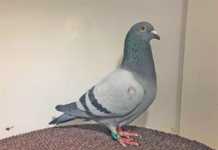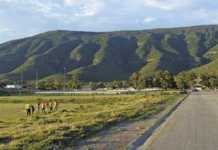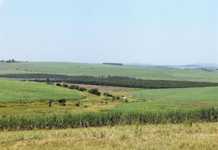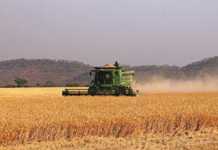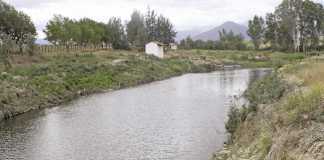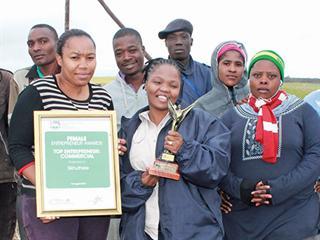
Sugarcane farmer Khanyisile Mkhanyawo was recently voted KZN’s top entrepreneur in the commercial category of the Department of Agriculture, Forestry and Fisheries’ (DAFF) annual Female Entrepreneur Awards. Born to a single mother in Ndwedwe near Durban, Khanyi was raised by her grandmother. It was a tough childhood: money was scarce and the family relied on their home garden for food.
“Because we were poor, I decided when young that I wanted to change our family’s situation,” she recalls. With determination and the support of government, neighbours and the sugarcane industry, Khanyi is doing just that. A teacher by profession, she taught for five years before giving it up and cashing in her pension. She then applied for a farm through the Department of Rural Development and Land Reform’s (DRDLR) Land Redistribution for Agriculture Development (LRAD) programme.
At the request of DRDLR, Khanyi founded the Sikhuthele Land Trust in 2008 with 40 beneficiaries, many of whom are related to her. A year later, they received the title deeds to a 641ha, R2,1 million farm on the Oribi Flats in southern KwaZulu-Natal.
Predominantly bushveld, the farm had only 60ha planted to sugarcane. “It was hard because, although this farm was functioning, the cane was not in good condition,” she says.
Khanyi once again managed to access government support and the trust received R1,2m through the Comprehensive Agricultural Support Programme from DAFF. This was used to replant the 60ha sugarcane in 2011. Further grant funding covered the cost of fixing a borehole and purchasing tractors, trailers, implements such as slashers and ridgers, and a bakkie.
Production growth
In 2012, they received recapitalisation funding of R2,3m from the DRDLR, which was used to plant an extra 40ha. The farm delivered 1 011t to the sugarmill in 2009/10 and 2 600t last year. “The crop this season was 1 700t, because we cut more last year and so we have less carry-over cane. Next season, we estimate that 4 090t will be delivered,” explains Khanyi.
The sugarcane is transported to Umzimkulu Sugar Mill 37km away by a haulier who charges R183,80/t, but the trust members are striving to become self-sufficient.
“We sometimes use commercial farmers as contractors, because we don’t have much in the way of implements. But by next year, I want us to be able to do everything ourselves,” emphasises Khanyi. This year, the trust planted 55ha without the help of any contractors. “We’re doing almost everything by ourselves, such as ratoon management, planting and replanting. We have soil samples done by the South African Sugarcane Research Institute (Sasri) and fertilise according to those results,” she says.
Khanyi adds that the team can start seeing the results of their hard work. The previous farm manager provided mentoring for two years and the trust’s commercial farmer neighbours are always willing to assist when problems arise, which has helped them to avoid costly mistakes.
Khanyi has also completed a senior certificate course in sugarcane agriculture at Sasri to help her in her duties as farm manager. In addition, the SA Cane Growers’ Association assists with budgeting and planning, while Illovo’s Umzimkulu mill helps with technical support. Although the farm is profitable, there are no dividends to disperse as yet. “We’re still developing the farm and are putting all our money back into it,” explains Khanyi. Eight of the trust’s beneficiaries are employed on the farm. “We’re pushing to create more employment and have also created jobs for the nearby rural community,” she adds.
Ecotourism
Being close to Oribi Gorge and with views over the Oribi valley, the farm has ecotourism potential. Khanyi has applied for funding for an environmental impact assessment to clear bush for grazing and tourist facilities and to extend the area under sugarcane to 250ha. “For now, though, we’re focusing on sugarcane,” she says. Khanyi is ploughing the R125 000 she received in prize money back into the farm. “I also put my pension money into the farm. I’m the only one who puts personal money into it, but I don’t mind. I’m the founder and I want it to work. That is why I’m sacrificing everything I have.”

